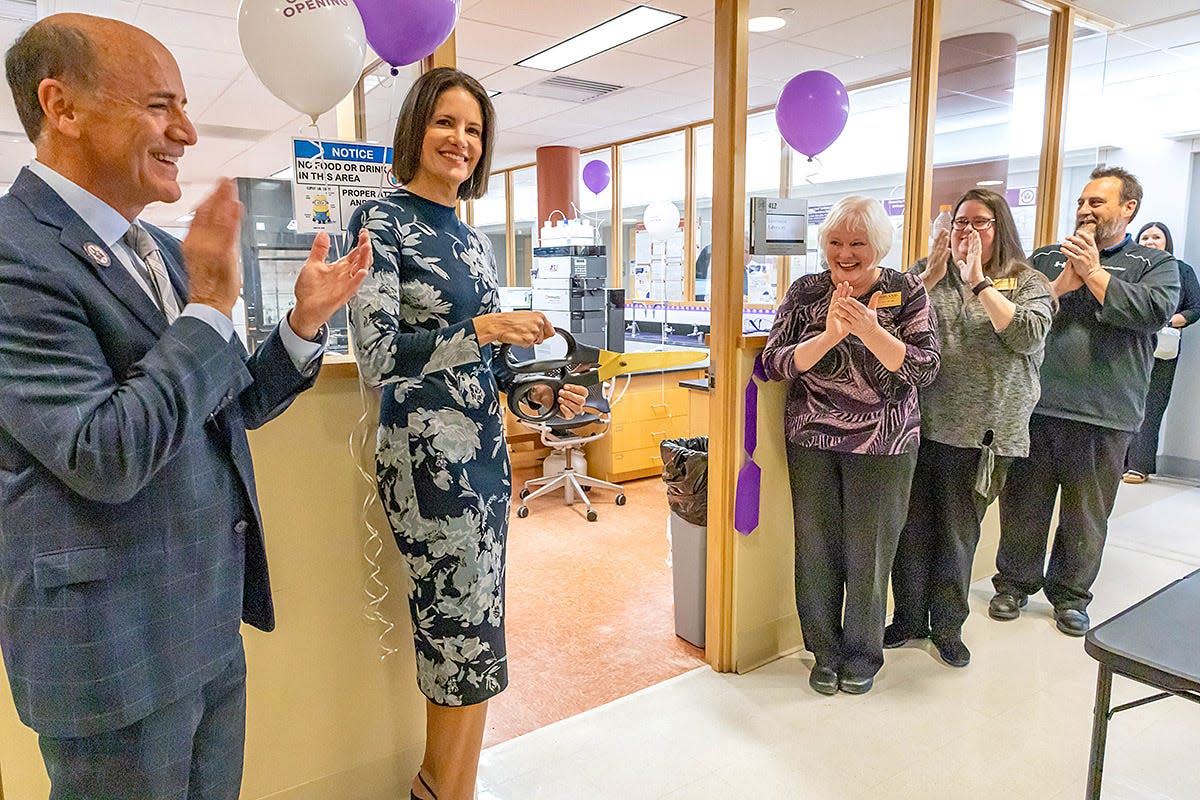Ashland University, Shimadzu partner to boost research capability in classrooms
Ashland University has entered into a partnership with Shimadzu, a multinational leader in the manufacturing of precision scientific equipment, that will transform AU’s capability for research and teaching within the College of Arts and Sciences.
AU acquired four Shimadzu scientific instruments, valued at more than $500,000, that have been installed in the Kettering Science Center. AU is now a SPARQ partner, which stands for Shimadzu Program for Academics, Research and Quality of Life, an invitation-only opportunity of which few schools in the United States are granted access.
“I am delighted to work with Shimadzu Scientific Instruments to enhance the Kettering Labs because the SPARQ program represents a true partnership,” said Katie Brown, Ph.D., dean of AU’s College of Arts and Sciences. “Shimadzu has worked closely with our faculty and staff to ensure that the selection of instruments is catered to our student learning outcomes. Shimadzu also ensures that our faculty will have the support they need to make the most effective use of the new equipment in both teaching and research.”

“We at Shimadzu are very excited for this SPARQ partnership with Ashland University and to see how the faculty and students expand their research experience. Ashland now has a state-of-the-art lab that ensures any testing needs are within their capabilities,” said Matthew Chaidez, regional manger of Shimadzu Scientific Instruments. “I am personally most excited for the students. Having this level of instrumentation and experience as an undergraduate will be an invaluable tool to prepare them for their futures in the science field.”
The lab equipment will benefit all students and faculty, especially those in the biology, chemistry, environmental science, geology, physics and toxicology academic programs.
A run-down about the new instruments
The four new instruments are:
Liquid Chromatography Mass Spectrometer, a mass spectrometer offering fast and accurate detection of trace chemical compounds in pharmaceutical samples, environmental pollutants and other mixtures
Nexera Ion Chromatography System, which can process water samples, a key component for environmental science, analytical chemistry and geochemistry courses and research
Nexera Gel Permeation Chromatography System, which possesses polymer-specific analysis tools that will elevate research in a variety of applications and complies with American Chemical Society-approved programs
Inductively Coupled Plasma Atomic Emission Spectrometer, a device that measures concentrations of many metals and solutions at once, which will enhance current research efforts in toxic metals found in consumer products, environmental water and social studies and geochemical measurements
“One of the things we pride ourselves on is to give students hands-on experience with state-of-the-art equipment. Students come here because of the instrumentation we have in lab that they know they are going to get trained on,” said Jeff Weidenhamer, Distinguished Professor of Chemistry. “This will help us to continue to attract excellent students.”
As for the SPARQ partnership, it will serve as a bridge between academic research and applications development. AU faculty and students will consult and work with Shimadzu’s scientists and industry experts on various projects.
“It is an honor to be part of the Shimadzu SPARQ program. Not only will the new equipment help to sustain and to expand our chemical instrumentation laboratory, but this initiative is a great step forward in our deep-rooted efforts to provide hands-on opportunities for scientific study,” said Rebecca Corbin, Ph.D., chair of the department of chemistry, geology and physics at AU.
Shimadzu selected AU as an award recipient because of its track record of science student preparation and its potential for growth.
“Shimadzu is delighted to establish this partnership with Ashland University. Through this collaboration, we aim to elevate their already outstanding chemistry program by providing cutting-edge instrumentation,” said Dave Jorissen, sales director at Shimadzu. “Our commitment extends beyond technology; we look forward to fostering continued collaboration with Ashland’s incredibly talented students and faculty. We view this as the beginning of a long and mutually beneficial relationship.”
1992 graduate instrumental in forming the partnership
This partnership and the equipment were made possible by a lead gift from Dawn Swit, class of 1992, who labeled it an “easy decision” to be a part of.
“Being in a science-based field, I understand the company or academic institution … is only as good as the level of the equipment that they have,” said Swift, who recently retired from a career in the information technology and insurance business. “If a (student’s) resume doesn’t show that they’ve worked with the equipment their industry wants them to have, they are at a disadvantage. So, this will not only help (Ashland) attract students, but it will help the graduates get better jobs. And, Shimadzu seems like a great partner. Meeting with the rep and the engineer, I’m even more excited what this will mean.”
During an April 13 ribbon-cutting ceremony and visit to AU, Swit was excited to see how “the campus has really continued to grow” and looks “even more amazing than when (she) was here.” And, she is very much looking forward to seeing the impact of the Shimadzu partnership.
“I love it. I’m so excited. It gives me goosebumps to think that there are going to be students in here grinding away at 11 o’clock at night on a Tuesday trying to work on their samples and finish a project to be able to turn in. It’s fantastic,” she said.
Also making significant donations to the Shimadzu partnership were Jeff Gorman, Sherrill Hudson, Richard Metz and Donald Senz, as well as the dean’s office of the College of Arts and Sciences and the department of chemistry, geology and physics.
Shimadzu Scientific Instruments (SSI) is the American subsidiary of Shimadzu Corporation, headquartered in Kyoto, Japan.
This article originally appeared on Ashland Times Gazette: Ashland University labs get major upgrade in partnership with Shimadzu
